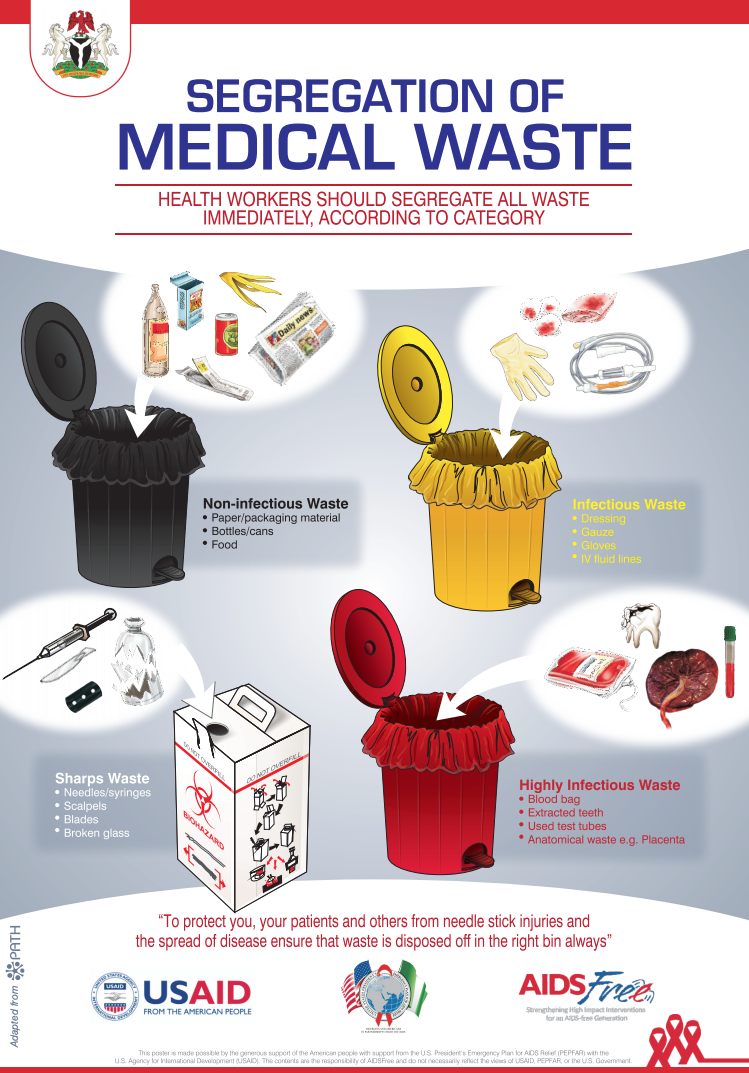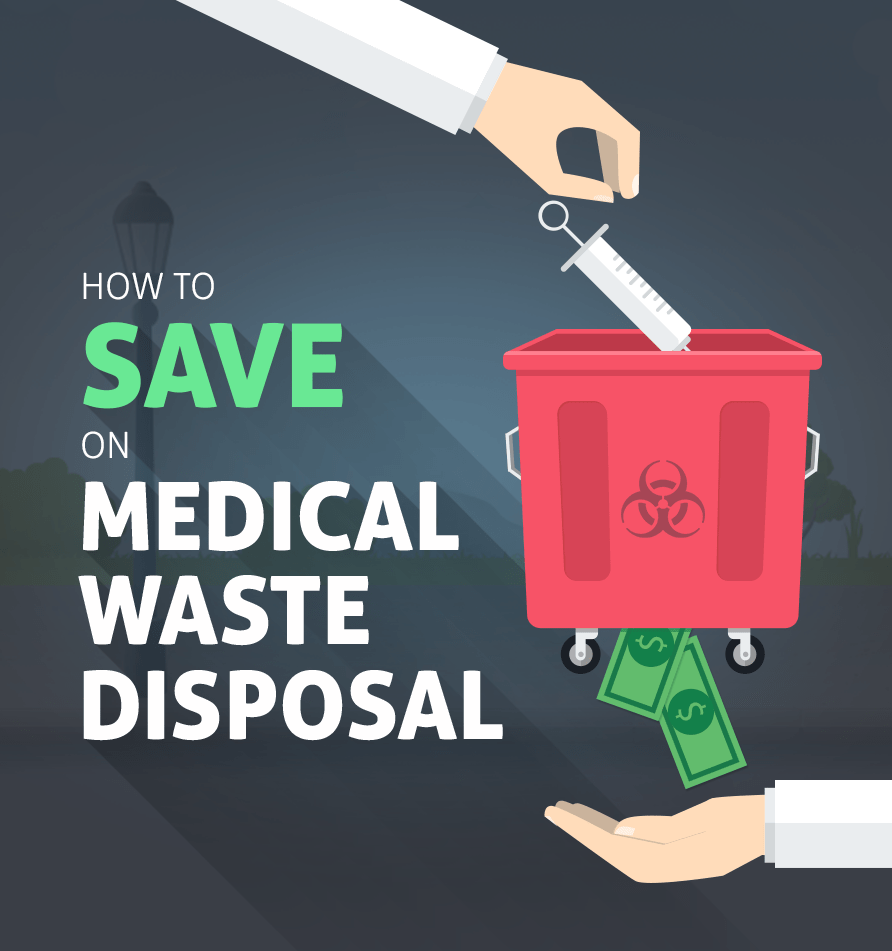Safe and Efficient Medical Waste Removal: Your Trusted Environmental Companion
Wiki Article
The Value of Appropriately Taking Care Of Medical Waste
Appropriate administration of medical waste is of utmost significance in health care facilities. The handling, storage space, and disposal of medical waste require rigorous adherence to guidelines and policies to make sure the safety and security of people, medical care workers, and the atmosphere. Improper management of clinical waste can position major health threats, consisting of the transmission of contagious illness and injuries from sharp objects. Poorly disposed of clinical waste can have harmful results on the setting, polluting water resources and soil. Medical care facilities have regulatory and lawful responsibilities to appropriately take care of medical waste, and failure to conform can result in fines and lawful consequences. By applying ideal techniques for risk-free handling and disposal of clinical waste, healthcare experts can alleviate these risks and add to a safer and healthier environment for all. Adequate education and learning and training on waste administration are important for healthcare specialists to satisfy their duties in this field.Wellness Threats Related To Improper Waste Monitoring
Improper monitoring of medical waste presents significant wellness risks to both medical care employees and the public - WasteX Medical Waste Disposal. Clinical waste, that includes sharps, infectious products, drugs, and contaminated substances, requires proper handling and disposal to avoid the spread of infections, injuries, and exposure to damaging substances
One of the primary health and wellness risks related to inappropriate medical waste monitoring is the transmission of contagious diseases. Health care employees who come into contact with polluted waste might contract conditions such as HIV, liver disease, or various other bloodborne microorganisms. If medical waste is not properly disposed of, it can pollute the setting, water sources, and even food, leading to the spread of conditions within the community (medical waste removal).
Inappropriate waste administration can also cause injuries, specifically from sharps such as needles, scalpels, and damaged glass. Accidental needle pricks can result in the transmission of bloodborne illness, while cuts from sharp things can create serious injuries and infections.
In addition, the inappropriate disposal of pharmaceutical waste can bring about the contamination of water products. When expired or unused medications are purged down the toilet or discarded inappropriately, the chemicals can leach into water resources, influencing aquatic life and possibly entering the human food cycle.
Environmental Impact of Improperly Disposed Medical Waste
Among the significant consequences of inadequate management of clinical waste is its harmful effect on the environment. Poorly disposed clinical waste postures a major danger to communities, water bodies, and the total balance of the setting. WasteX Medical Waste Disposal. The hazardous products contained in medical waste, such as contagious representatives, drugs, and chemicals, can infect air, water, and soil, leading to prevalent pollution and degradationWhen clinical waste is not effectively set apart, treated, and disposed of, it can locate its way right into water bodies with incorrect garbage dump techniques or unlawful disposing. This can lead to the contamination of groundwater and surface water, impacting aquatic life and potentially polluting drinking water sources. The launch of dangerous chemicals and drugs right into the setting can interrupt communities and injury both pet and plant types.
In addition, inappropriate incineration of clinical waste can launch hazardous contaminants, including dioxins and furans, into the atmosphere. These pollutants have actually been connected to numerous health and wellness problems, consisting of breathing issues, reproductive problems, and also cancer. The release of greenhouse gases during incineration also adds to environment modification.
To mitigate the ecological effect of poorly disposed medical waste, it is important to execute proper waste monitoring techniques. This includes segregation of waste at the resource, proper therapy methods, and secure disposal methods. By doing so, we can minimize the pollution and shield the environment from the damaging consequences of medical waste mismanagement.
Lawful and Regulative Commitments for Medical Care Facilities
In order to address the ecological impact of incorrectly disposed clinical waste, healthcare facilities are required to abide by lawful and regulative obligations. These commitments are implemented to make sure the correct handling, storage, transportation, and disposal of clinical waste in a secure and environmentally liable fashion.One of the vital legal responsibilities for healthcare facilities is to acquire the necessary permits and licenses for taking care of medical waste. This consists of getting a waste generator identification number and following federal, state, and neighborhood regulations. Healthcare centers should additionally keep comprehensive documents of the kinds and quantities of medical waste produced, along with the approaches utilized for its disposal.
Furthermore, medical care facilities need to apply appropriate partition and product packaging treatments for various types of medical waste, such as sharps, transmittable waste, and pharmaceutical waste - medical waste removal service. This consists of utilizing watertight containers, biohazard bags, and sharps containers that fulfill regulatory criteria
Medical care centers are likewise in charge of making sure that their team receive appropriate training on the correct handling and disposal of clinical waste. This consists of training on infection control, personal protective equipment, and waste administration procedures.
Finest Practices for Safe Handling and Disposal of Medical Waste
To make sure the secure handling and disposal of medical waste, health care facilities ought to apply best practices. These methods are important to protect the health and safety of both medical care employees and the public. The appropriate administration of medical waste is crucial in protecting against the spread of contagious illness and lessening environmental contamination.One of the most effective techniques for secure handling and disposal of medical waste is segregation. Healthcare facilities must separate different kinds of medical waste, such as sharps, contagious products, and pharmaceutical waste, to stop cross-contamination. Proper labeling and shade coding of waste containers likewise play a crucial role in guaranteeing the correct partition of clinical waste.
One more essential ideal method is making use of appropriate containers for saving and transporting clinical waste. These containers ought to be watertight, puncture-resistant, and effectively sealed to stop any feasible release of harmful products. Additionally, health care centers need to establish clear methods for the collection, storage, and transport of medical waste to minimize the danger of direct exposure and contamination.
Additionally, medical care facilities should train their team on the proper handling and disposal of medical waste. Normal training sessions and refresher programs should be carried out to keep health care employees upgraded on the most up to date guidelines and regulations. This will certainly assist make certain that everyone included in the procedure knows the prospective dangers and is outfitted with the required understanding and skills to manage clinical waste securely.
Education And Learning and Training for Healthcare Professionals in Waste Monitoring
Medical care professionals require extensive education and training in waste administration to make sure the correct handling and disposal of clinical waste. The administration of clinical waste is an important part of medical care procedures as it straight impacts the health and wellness of both healthcare employees and the public. Proper education and learning and training gear up medical care professionals with the required expertise and abilities to dispose and deal with of medical waste in a safe and ecologically liable fashion.Education and training programs for healthcare specialists in waste administration cover an array of topics, consisting of the category and segregation of medical waste, proper product packaging and storage space, labeling and transportation needs, and using individual safety devices. These programs also highlight the importance of adherence to neighborhood, national, and international regulations and guidelines governing clinical waste administration.
By obtaining detailed education and learning and training in waste management, healthcare specialists can efficiently minimize the risks connected with medical waste, such as the transmission of transmittable diseases and the possible harm to the atmosphere. WasteX Medical Waste Disposal. Trained professionals can determine and execute ideal practices that promote sustainability and efficient waste administration methods within medical care facilities.
Continuous education and learning and training in waste monitoring should be a continuous concern for healthcare experts, as waste administration techniques and laws may advance in time. By remaining updated with the most recent advancements in waste monitoring, health care experts can make sure that they are furnished with the understanding and skills needed to make enlightened decisions and contribute to the general renovation of waste administration practices in healthcare settings.

Final Thought
In conclusion, proper administration of medical waste is important to alleviate health threats and lessen the environmental impact. Health care facilities have legal and regulatory commitments to ensure secure handling and disposal of clinical waste. Complying with best techniques and providing education and learning and training for medical care experts in waste administration are essential for keeping a healthy and safe environment. Full Article By sticking to these guidelines, healthcare centers can secure public health and wellness and maintain the stability of our ecological communities.
Medical care professionals need comprehensive education and training in waste monitoring to make sure the proper handling and disposal of medical waste - medical waste removal service. The administration of medical waste is an essential part of healthcare procedures as it straight impacts the health and safety of both health care employees and the basic public
Report this wiki page